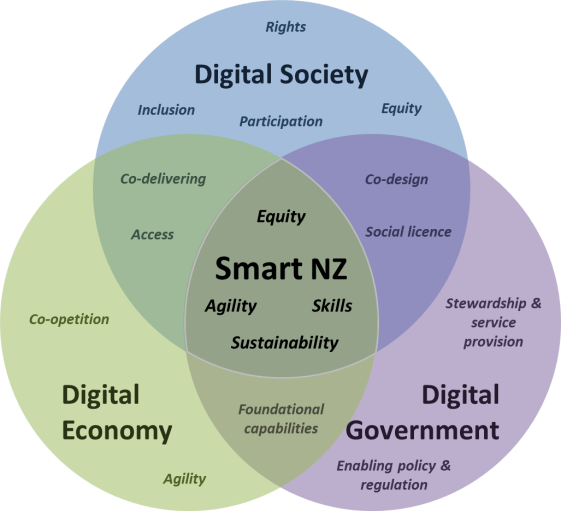James Bolitho is a Senior Advisor in the Digital Futures Team at DIA. In this blog post James shares what he learnt at the 2019 New Frontiers Summit.
The Futures, Insights and Impact team in the GCDO takes a forward-looking view of how the world is changing to support a government that is not only fit for purpose, but fit for future.
We're building a community to explore the opportunities and challenges for government in the digital age together.
New Frontiers Summit
Early in March, we in the Digital Futures Team had the pleasure of attending the New Frontiers Summit in Upper Hutt.
New Frontiers is the flagship gathering of the Edmund Hillary Fellowship (EHF), a programme designed to attract social entrepreneurs and investors from around the world to New Zealand, as well as to incubate Kiwi entrepreneurship.
Every year two new cohorts of fellows are admitted to the program. The summit functions not just as a welcome ceremony for them, but also as a platform for them to present their ideas and interact with a wider community of experts.
As such, the summit routinely attracts an eclectic mix: everyone from venture capitalists, technologists, social entrepreneurs, and climate activists to government officials, Iwi leaders, farmers, and yogis. This year alone over 40 different nationalities were represented.
At its best, the conference is a unique space in which EHF fellows and practitioners from wildly different backgrounds and geographies can mingle and share ideas. Typically we found ourselves one minute engaging with small business owners newly arrived from Brazil, the next having lunch with a former ops developer at Microsoft.
Thought provoking ideas and questions
The first day keynote speaker was Naval Ravikant, founder of AngelList and acclaimed investor. He presented a range of thought provoking ideas and questions, among them:
- New technologies are often destructive at first before they are made into productive tools for human advancement — one can look at the advent of nuclear energy or drones as examples of this trend.
- Could New Zealand, with its reputation for trust and good governance, become the first backer of a state-owned cryptocurrency?
- The dangers of over-scheduling and not taking enough time for one’s self during the day to reflect and absorb.
Finding strong momentum
We found there was never a dull moment, and never someone whom we did not feel we could learn from. We came away having heard a number of compelling voices in both digital and future thinking, and having engaged in a number of important conversations that we intend to expand within the public sector.
Many of our new contacts expressed similar enthusiasm at the prospect of collaborating with government and creating better public outcomes. The rare kind of momentum generated at this summit is what we need to capitalise on if we are to bring about these very outcomes.
Challenges and opportunities for public servants
However, also present were sobering reminders that we have further to go. There were frank discussions over Māori-Crown relations and collaborative efforts (or a lack thereof) in the land conservation and climate-action spheres.
There was a persistent feeling among some that government had been a stumbling block rather than an asset to them, and that they might be better served by forging ahead on their own. We constantly found ourselves asking — “how can we be part of the solution?”
Though there were a handful of representatives from DIA, MBIE, MPI, MFE, and MFAT, we would like to have seen even more government participation.
Indeed, if positive change is the animating spirit behind New Frontiers, then it provides a necessary platform for public servants to attend, engage, listen, and debate.
Working together
There needs to be a broader mind-set shift among voices outside of government, one that moves the tenor of the conversation from “You’re from government, what can you do for me?” to “You’re from government, how can we accomplish this together?”
This, more than anything, reflects our fundamental vision of government’s role in creating a forward-thinking and future-ready Aotearoa / New Zealand. It shares the same responsibilities and shoulders the same burdens as the private sector and society as a whole. Only when all three work together are the best outcomes truly achieved.

Want to join the Digital Futures community?
Contact us at futures@digital.govt.nz to discuss further.


